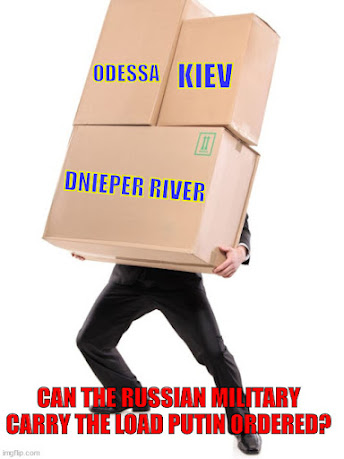In the short run, even inferior states can mass superior power at the closer point of conflict. But what then? Yet what if the short run is the effective horizon of the inferior but locally superior state hoping for the best after that?
This article explains that Russia has the short-term advantage in deploying combat power to Ukraine despite NATO's superior power:
The good news is that Putin almost certainly understands that an invasion of Ukraine would lead to a complete break in relations with the West, rendering Russia in effect a dependent junior partner of China. Moreover, he probably realizes that Russian forces would very likely have to deal with guerrilla resistance in occupied Ukrainian territory, and that unoccupied portions of western Ukraine could become a host for U.S. and NATO forces over the longer term. It is doubtful that these are outcomes he finds appealing. He would probably prefer to find an alternative way to derail a U.S. alliance with Ukraine if Biden is prepared to bargain. But if Washington refuses to recognize that Russian redline, he may well be prepared to fight—and there is not much the United States could do to stop him.
I've droned on about that issue of locally superior power in the short run concerning Chinese threats and Russian threats.
And yes, a NATO intervention into eastern Ukraine would be very limited and probably not decisive. Even NATO air power would be scantily supported and more symbolic than decisive. It would take a lot of time to mobilize forces, establish the logistics, and move forces into Poland, Romania, and western Ukraine.
Yet I don't think Russia 's military is as potent as the authors claim, whether against NATO or Ukraine.
Russia's brilliant Crimea takeover in winter 2014 was reliant on special circumstances.
And the Russian invasion of Ukraine's Donbas just half a year later bogged down short of taking all of the region against unexpected Ukrainian resistance that continued to foil Russian hopes.
Ukraine is way more prepared now than in summer 2014. Russia is better, too. But does Russia's improvement match Ukraine's improvement?
I don't think so. The simple fact that Russia's invasion threat has to be backed by so many more troops this time indicates Russia needs more of its military to make a credible threat.
Mind you, the increase in Russian quantity may make up for the narrowing of the quality gap since 2014. But that means of ensuring Russian superiority has a critical weakness--Russian casualties.
Russian troops could probably plow their way to the Dnieper River line. But how many dead Russians can Putin endure to do that?
I think the scope of a large invasion from Kiev to the Black Sea is too much for Russia to sustain for long. Putting 100 battalion tactical groups into an invasion must surely hollow out every combat brigade across all of Russia. Those BTGs are a means of scraping something out of less-than-adequate brigades. And I suspect a large fraction of those 100 aren't very good given the state of the Russian army. How many ill-trained conscripts were needed to fill out that number of units?
Here's a good explanation of Russia's situation against Ukraine.How long does Russia think it can afford to fight in Ukraine against surviving Ukrainian army units on the other side of the Dnieper River? With insurgents and irregulars tormenting second-rate Russian occupying troops? With Ukraine getting and using longer range missiles to bombard Russia's bases in Crimea? Without tempting Russia's enemies around their long border to take advantage in some way? Without breaking Russian logistics? Without crippling Russia's economy? Without inspiring public resistance to excessive Russian casualties?
Will the body bags going back to Russia stop when Russia declares victory?
All the problems the authors describe probably give Russia a lot of problems for that "ideal" river line defensive position. Russia may think it can threaten with nukes out of that dilemma, but the threat isn't credible. Russia says it needs Ukrainian territory as a buffer against destruction of Russia by an invasion NATO can't carry out; but Russia will risk immediate nuclear destruction to hold the buffer?
Ukraine might even endure enough pain to finally rouse themselves to eliminate the power of the oligarchs, who thrive on corruption. I've long argued that Ukraine must defeat corruption to avoid being a smaller and weaker version of Russia.
But it gets worse for Russia. China isn't Russia's ally. Russia is a junior partner of China right now. If Russia alienates NATO for a generation at least, China knows Russia loses the ability to flip to the West to resist Chinese land claims against Russia in the Far East.
And with Russia needing all of its decent military units to hold their new buffer plus its border with freshly outraged and worried NATO countries, how does Russia get any leverage to deter Chinese claims on Russian Far East territory?
What will China demand from its vassal Russia to remain Russia's de facto protector?
I'd say this situation argues for Russian caution. I'd say they settle for some diplomatic victory whether real or imaginary. Or maybe a brief punitive mission with artillery strikes. And maybe even a minor expansion of territory under Russian control. But with the Fuck-Up Fairy living in Moscow full time, who knows whether Putin will destroy Russia in pursuit of his glory?
Have a super sparkly day.
UPDATE: This answers one question I've had about Russia's build up:
The build-up this time has been much more serious, in terms of not just the teeth but the tail. They have put a lot of effort into making sure that there is all the logistical backup, which is what you need for a real attack.
Putin could fight a war. That's different than whether it is a good idea or whether Putin or even Russia can survive that war.


